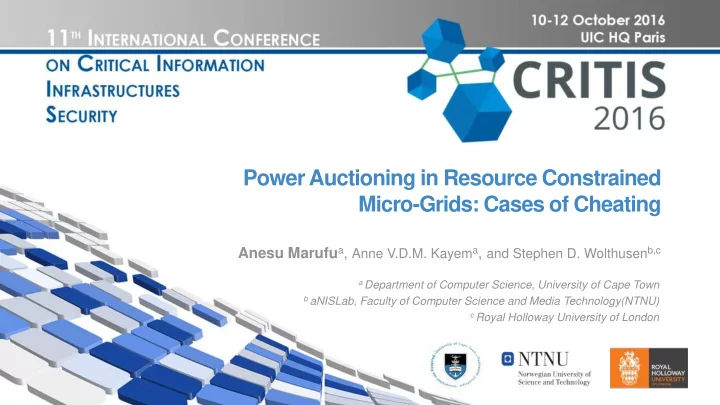

Power Auctioning in Resource Constrained Micro-Grids: Cases of Cheating Anesu Marufu a , Anne V.D.M. Kayem a , and Stephen D. Wolthusen b,c a Department of Computer Science, University of Cape Town b aNISLab, Faculty of Computer Science and Media Technology(NTNU) c Royal Holloway University of London
Table of Contents Background Problem Support of Cheating Attacks Cases of Cheating Proposed Countermeasure Acknowledgements References 2 / 15
Background – Continuous Double Auctioning Continuous Double Auctioning (CDA): • market mechanism supporting power trading in resource constrained (RC) smart micro-grids Advantages: • coordination of distributed components on incomplete and imperfect information • incur minimal computational cost • ensure robust, reliable and fair energy allocation 1) Anesu M.C. Marufu, Anne V.D.M. Kayem, and Stephen D. Wolthusen (2015) A Distributed Continuous Double Auction Framework for Resource Constrained Microgrids, In Proceedings, 10th International Conference on Critical Information Infrastructures Security (CRITIS 2015), 3 / 15
Background – Resource Constrained Micro-grid Resource Constrained Micro-Grids (MG): • small, integrated energy systems intelligently managing distributed load and energy resources. • capable of autonomous operation in case of failure of national grids, (islanded mode) • operate on resource limited information technology infrastructure. • we conform to a MG model specified in other work 2) Anesu M C Marufu, A V D M Kayem, and S. Wolthusen (2016 ). Fault-Tolerant Distributed Continuous Double Auctioning on Computationally Constrained Microgrids. In Proceedings of the 2nd International Conference on Information Systems Security and Privacy, ICISSP 2016, pages 448 – 456. SCITEPRESS, 2016. 4 / 15
Background – Resource Constrained Micro-grid Control Centre Sentinel Sentinel Buyer Shared Smart Meters Neighbourhood Area Network Seller Trading Agents Household Area Network 5 / 15
Problem – Realisation of Cheating -Fairness important in ensuring trust - CDA [2] is ideal – Fairly robust to traditional CDA Order-book cheating forms: e.g. Multiple bidding; Bid shading, Shill bidding Strategy Manipulation Attacks Agent Strategy - Victim Strategy Downgrade -Collusion Attack Resource -operate on resource limited information limited technology infrastructure. Microgrid 6 / 15
Support of Cheating Attacks • Superior strategies = more surplus vs. inferior counterparts • Superior strategy: Adaptive Aggressive (AA) • Inferior strategy: Zero Intelligence (ZI) • Gjerstad-Dickhaut Extended (GDX) challenges supremacy of AA. • GDX gains more surplus vs. AA sometimes 3) Marco De Luca and Dave Cliff (2011). Human-agent auction interactions: Adaptive-aggressive agents dominate. In IJCAI Proceedings-International Joint Conference on Artificial Intelligence, volume 22, page 178. Citeseer, 2011 4) Perukrishnen Vytelingum (2006). The structure and behaviour of the Continuous Double Auction. PhD thesis, University of Southampton, 2006. 5) Daniel Vach and Ales M. A. Mar ´ s ˇal (2015). Comparison of double auction bidding strategies for automated trading agents, 7 / 15 2015.
Cases of Cheating 1) Victim Strategy Downgrade 2) Collusion Attack • a number of traders collude to change • One adversary uses a tool (e.g. bidding strategy malware) to control other participants’ trading agents. • K colluders coordinate agent strategy change: AA-GDX • dynamic ‘downgrade’ of victim trading strategy. • Adversary population ratio to victim population must ensure max. surplus • Adaptive Aggressive (AA) > Zero Intelligence ZI strategy 8 / 15
Proposed Countermeasure 1 • Cheating is auction specific – likewise countermeasures • Current security measures are inadequate: - Absence of central auctioneer - Different clearing mechanisms • Cheating gives rise to exceptions , • Exception handlers adopting a citizen approach are proposed • Make use of allocative efficiency & # of messages 9 / 15
Proposed Countermeasure 2 Central Sentinel Sentinel Buyer Shared Smart Meters Neighbourhood Area Network Seller Sentinels Household Area Trading Agents Network 10 / 15
KEY TA -Sentinel Buyer Token Seller T-Sentinel 11 / 15
Acknowledgements 12 / 15
Conclusion • Continuous Double Auctioning ideal for power allocation • Automated Cheating is possible • Exception handling mechanism using a citizen approach can be used • Future work: validate and evaluate the exception handling protocol 1) Anesu M.C. Marufu, Anne V.D.M. Kayem, and Stephen D. Wolthusen (2015) Circumventing cheating on Power Auctioning in Resource Constrained Micro-grids. To appear in Smart City 2016, Sydney, Australia 13 / 15
14 / 15
Recommend
More recommend